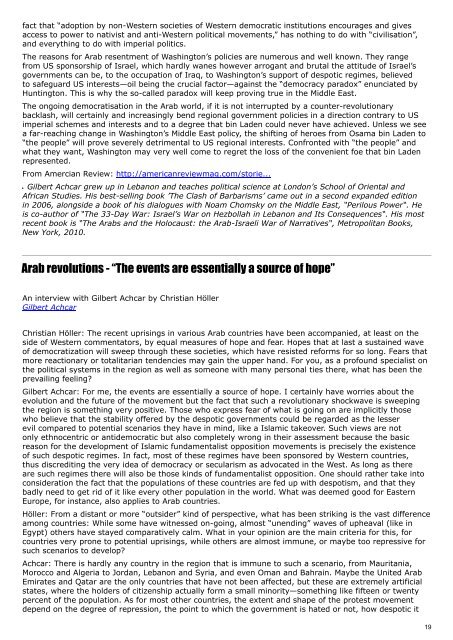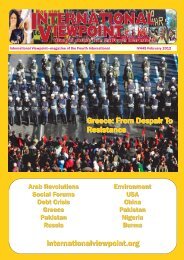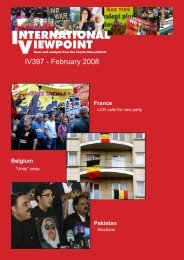here - International Viewpoint
here - International Viewpoint
here - International Viewpoint
Create successful ePaper yourself
Turn your PDF publications into a flip-book with our unique Google optimized e-Paper software.
fact that “adoption by non-Western societies of Western democratic institutions encourages and gives<br />
access to power to nativist and anti-Western political movements,” has nothing to do with “civilisation”,<br />
and everything to do with imperial politics.<br />
The reasons for Arab resentment of Washington’s policies are numerous and well known. They range<br />
from US sponsorship of Israel, which hardly wanes however arrogant and brutal the attitude of Israel’s<br />
governments can be, to the occupation of Iraq, to Washington’s support of despotic regimes, believed<br />
to safeguard US interests—oil being the crucial factor—against the “democracy paradox” enunciated by<br />
Huntington. This is why the so-called paradox will keep proving true in the Middle East.<br />
The ongoing democratisation in the Arab world, if it is not interrupted by a counter-revolutionary<br />
backlash, will certainly and increasingly bend regional government policies in a direction contrary to US<br />
imperial schemes and interests and to a degree that bin Laden could never have achieved. Unless we see<br />
a far-reaching change in Washington’s Middle East policy, the shifting of heroes from Osama bin Laden to<br />
“the people” will prove severely detrimental to US regional interests. Confronted with “the people” and<br />
what they want, Washington may very well come to regret the loss of the convenient foe that bin Laden<br />
represented.<br />
From Amercian Review: http://americanreviewmag.com/storie...<br />
Gilbert Achcar grew up in Lebanon and teaches political science at London’s School of Oriental and<br />
African Studies. His best-selling book ’The Clash of Barbarisms’ came out in a second expanded edition<br />
in 2006, alongside a book of his dialogues with Noam Chomsky on the Middle East, “Perilous Power“. He<br />
is co-author of “The 33-Day War: Israel’s War on Hezbollah in Lebanon and Its Consequences“. His most<br />
recent book is “The Arabs and the Holocaust: the Arab-Israeli War of Narratives“, Metropolitan Books,<br />
New York, 2010.<br />
Arab revolutions - “The events are essentially a source of hope”<br />
An interview with Gilbert Achcar by Christian Höller<br />
Gilbert Achcar<br />
Christian Höller: The recent uprisings in various Arab countries have been accompanied, at least on the<br />
side of Western commentators, by equal measures of hope and fear. Hopes that at last a sustained wave<br />
of democratization will sweep through these societies, which have resisted reforms for so long. Fears that<br />
more reactionary or totalitarian tendencies may gain the upper hand. For you, as a profound specialist on<br />
the political systems in the region as well as someone with many personal ties t<strong>here</strong>, what has been the<br />
prevailing feeling?<br />
Gilbert Achcar: For me, the events are essentially a source of hope. I certainly have worries about the<br />
evolution and the future of the movement but the fact that such a revolutionary shockwave is sweeping<br />
the region is something very positive. Those who express fear of what is going on are implicitly those<br />
who believe that the stability offered by the despotic governments could be regarded as the lesser<br />
evil compared to potential scenarios they have in mind, like a Islamic takeover. Such views are not<br />
only ethnocentric or antidemocratic but also completely wrong in their assessment because the basic<br />
reason for the development of Islamic fundamentalist opposition movements is precisely the existence<br />
of such despotic regimes. In fact, most of these regimes have been sponsored by Western countries,<br />
thus discrediting the very idea of democracy or secularism as advocated in the West. As long as t<strong>here</strong><br />
are such regimes t<strong>here</strong> will also be those kinds of fundamentalist opposition. One should rather take into<br />
consideration the fact that the populations of these countries are fed up with despotism, and that they<br />
badly need to get rid of it like every other population in the world. What was deemed good for Eastern<br />
Europe, for instance, also applies to Arab countries.<br />
Höller: From a distant or more “outsider” kind of perspective, what has been striking is the vast difference<br />
among countries: While some have witnessed on-going, almost “unending” waves of upheaval (like in<br />
Egypt) others have stayed comparatively calm. What in your opinion are the main criteria for this, for<br />
countries very prone to potential uprisings, while others are almost immune, or maybe too repressive for<br />
such scenarios to develop?<br />
Achcar: T<strong>here</strong> is hardly any country in the region that is immune to such a scenario, from Mauritania,<br />
Morocco and Algeria to Jordan, Lebanon and Syria, and even Oman and Bahrain. Maybe the United Arab<br />
Emirates and Qatar are the only countries that have not been affected, but these are extremely artificial<br />
states, w<strong>here</strong> the holders of citizenship actually form a small minority—something like fifteen or twenty<br />
percent of the population. As for most other countries, the extent and shape of the protest movement<br />
depend on the degree of repression, the point to which the government is hated or not, how despotic it<br />
19









